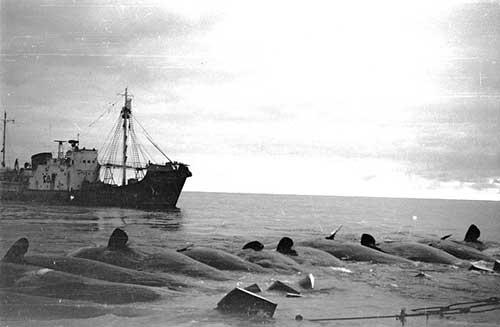This year marks the 100th anniversary of Russia’s Bolshevik Revolution, which created the first communist state—so it’s time to think of the whales.
In just a few decades, tens of thousands of whales were slaughtered by the Soviet Union in what the Pacific Standard Magazine, called “one of the fastest decimations of an animal population in world history—and happened almost entirely in secret.”
The Soviet Union was part of a 1946 treaty setting a limit on the number of whales countries could kill each year. By the time a ban on commercial whaling went into effect in 1986, the Soviets reported having killed 2,710 humpback whales in the Southern Hemisphere. They had actually killed nearly 18 times that many, and thousands of whales of other species that went unreported, according to Pacific Standard:
“It had been an elaborate and audacious deception: Soviet captains had disguised ships, tampered with scientific data, and misled international authorities for decades. In the estimation of the marine biologists Yulia Ivashchenko, Phillip Clapham, and Robert Brownell, it was ‘arguably one of the greatest environmental crimes of the 20th century.’”
It might not make sense at first—committing environmental crimes such as poaching for rhino horn or elephant tusks, or dumping toxic waste, can make or save a fortune. However, the Soviets followed no such logic.
The reason for the senseless slaughter of whales was triggered by a key tenet of communism: central planning.
Every industry in the Soviet Union was controlled by the state, which doled out production targets, regardless of whether there was demand. Whaling, according to the paper, was part of the state fishing industry, and there was a qu0ta for whaling that had to be met. Bonuses doled out for meeting these targets created an artificial market.
The whaling system was mortally wounded by inefficiency, gross waste, and “runaway socialistic competition,” as Ivashchenko, Clapham, and Brownell noted in a research paper.
Soviet fleets that reached their targets received extra rewards and they were celebrated in Soviet newspapers, while crews were given bonuses, according to Pacific Standard. If quotas weren’t met, penalties could be doled out: captains could be demoted and crew members could be fired.
While Norway and Japan have historically had a demand for whale meat and other byproducts, the Russians did not. “Once the blubber was cut away for conversion into oil, the rest of the animal, as often as not, was left in the sea to rot,” the magazine noted. In comparison, today, Norway, Japan, and Iceland today kill a combined 2,000 whales around the world each year.






